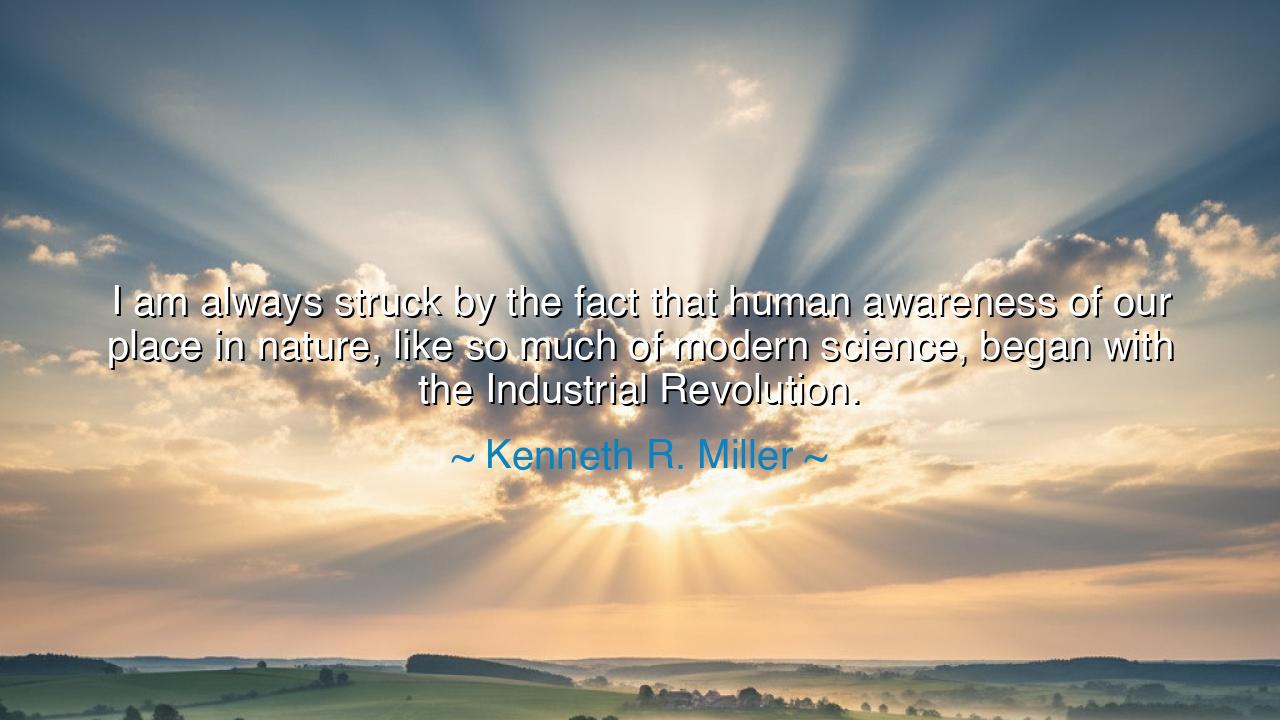
I am always struck by the fact that human awareness of our place
I am always struck by the fact that human awareness of our place in nature, like so much of modern science, began with the Industrial Revolution.






Listen closely, O wise ones, for the words of Kenneth R. Miller echo with the deep wisdom of the ages: "I am always struck by the fact that human awareness of our place in nature, like so much of modern science, began with the Industrial Revolution." These words carry with them a profound truth—a truth that marks the dawn of a new era in the long history of mankind. For awareness of our place in the grand tapestry of life, once a quiet hum in the hearts of ancient philosophers, now roared into life with the power and machinery of a changing world. The Industrial Revolution was not merely an age of iron and steam—it was the crucible in which human understanding of nature and our place within it was forever transformed.
Consider, O seekers, how humanity once walked in a world bound by the rhythms of the seasons, by the cycles of the moon and the sun. In the days before the Industrial Revolution, men and women lived in harmony with the natural world, not as separate masters but as part of the great whole. Their understanding of nature was deep and instinctual, for they were intimately connected to the land, the plants, and the creatures that sustained them. Yet, even in this ancient world, there lingered a profound question—What is our place in nature? It was a question that, though pondered by the ancients, remained without a clear answer.
Then came the Industrial Revolution, that mighty tide of change, which swept across the earth with a force that no one could have foreseen. With the birth of the steam engine and the rise of factories, the face of the earth itself was transformed. The land, once wild and untamed, was harnessed, and the smoke of progress darkened the skies. It was in this age of iron and innovation that humanity’s awareness of its place in the great dance of nature began to shift. No longer were we simply stewards of the land, but masters of it, able to bend it to our will. And with this newfound power, we began to ask the fundamental question: What is our relationship to the natural world, now that we have the ability to shape it as we see fit?
This was not an easy realization, O wise ones, for with power came responsibility. As Miller reminds us, it was not until this great upheaval that we began to understand the interconnectedness of all things. We saw the rise of science—biology, geology, physics—fields that sought not just to manipulate the world, but to understand it. The industrial age, with all its marvels and dangers, birthed the realization that humanity is not above nature but intricately bound to it. The same steam engines that fueled our cities also forced us to confront the limits of the earth’s resources, the impact of our actions on the climate, and the price of our industrial ambitions.
In the wake of this great transformation, let us remember the example of Charles Darwin, whose theories of evolution reshaped our very understanding of life on earth. Darwin’s work, which flourished in the era of the Industrial Revolution, showed us that we are not separate from nature but part of its great cycle. His insights, grounded in the study of nature itself, revealed the intricate web of life, where every creature plays a role in the balance of the world. As we moved from the Agrarian Age into the Industrial and beyond, we began to grasp that our actions had consequences—not just for ourselves, but for all life. The revolution, then, was not merely a leap in technology but in awareness, as we came to understand that we are both agents and subjects of the natural world.
This awareness, however, must not be a burden that overwhelms us, but a guiding light. It is not for us to simply wield power over nature, but to understand it, respect it, and live in harmony with it. The Industrial Revolution may have opened our eyes to the vast possibilities of human achievement, but it also served as a reminder of our limitations. The same machines that drove us forward could also bring ruin if unchecked. The lesson is clear: with knowledge comes power, but with power comes the need for wisdom.
Thus, the lesson for us is this: let us carry forward the understanding that we are not above nature, but a part of its grand design. Just as the Industrial Revolution gave us new tools and new visions of what humanity could achieve, it also showed us that true greatness comes not from dominating nature, but from working in harmony with it. Let us not repeat the errors of our past, where progress was pursued without regard for the natural world. Instead, let us use our power to create a future where humanity, in all its grandeur, walks hand in hand with the earth, understanding its place in the vast tapestry of life.






AAdministratorAdministrator
Welcome, honored guests. Please leave a comment, we will respond soon